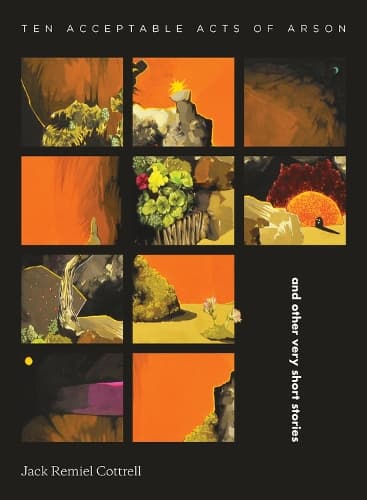Review: Ten Acceptable Acts of Arson, and other very short stories
Reviewed by Sam Finnemore
Jack Remiel Cottrell’s new collection arrives at a limelight moment for short stories in New Zealand, from Airini Beautrais’s Ockham-winning Bug Week to new works by Tracey Slaughter and Elizabeth Smither – but few can match Cottrell for pushing the limits of the form. Out of the 90-odd stories in this slim volume, none run much longer than a page and a good number are shorter than the paragraph you’re reading. If short fiction in general leaves little room for error, this is a high-wire act.
Not that Ten Acceptable Acts of Arson breaks a sweat. There’s an assured control behind all of these stories, whatever scale and rules they’re operating under. Some are relatively conventional in form but landed precisely in a few hundred words. Others deliver story in unexpected ways and places, including lists, advertisements or glossaries: all sorts of things can burst into narrative life in Cottrell’s hands, from public service announcements built into a wall of imperative, to a daily medication routine or the contents of a referee’s bag packed for a tournament.
The content is just as boundary-smashing as the form. Cottrell slips from the realistic to the supernatural and/or speculative, and vice versa, at a moment’s notice. Sometimes these uncanny elements are just on the very edge of suggestion, captured in a word or a title. Hauntings are a repeat concern – whether it’s characters from unfinished stories, pet tortoises, phantom limbs (and the phantoms that reach out for them) or the ghost of a home itself, sighing around the corners of an abandoned house.
In other places mythology bleeds into modern life: the devil builds a cunning trap for conscientious readers of terms and conditions; an entrepreneur attempts to disrupt travel over the Styx with a used kayak; fairies and robots fight a turf war in a railway underpass, with intervening police digitally defrauded or drained by enchantment. Almost every possible level of sci-fi extrapolation is canvassed too, from Black Mirror-style cautionary tales to the effects of time-travel on campus life, androids navigating their own viral pandemic, or the distant aftermath of interstellar travel. There’s a consistent mood flowing throughout the collection: open to possibility, ready to embrace the absurd and paradoxical, but very much attuned to tough realities. That’s maintained as similar ground is covered in different styles, from comic and high-concept to downbeat and devastating.
Ten Acceptable Acts plays a careful game with voice and perspective as well, with Cottrell clearly aware of the hybrid potential of the collection as a whole: the various pocket universes it contains aren’t easily collapsed down to the perspective or identity of their author, which makes the moments where they do take a seemingly direct personal line that much more disarming. And even those moments contain curveballs: pieces like Where writers get their ideas switch from the amusing and confessional (TV shows that are just past their prime) to the existentially unsettling (a long walk to a dry well, always the same distance from wherever the writer happens to be).
Rhythms and repeated elements bind the collection together. A Day in the Life appears in instalments at the start of each section; across three different stories, the limitations of magic are rueful, predictable and unfortunate, in almost a ritual progression. The book itself is divided into seven parts, Monday through Sunday, complete with lunchtime intervals featuring a handful of quickfire one or two-sentence narratives; it’s a choice that both lends further layers of symbolism to individual stories and extends the balancing act of personal-but-not-quite-confessional perspective across the whole collection.
The layers of reference and allusion throughout the collection are unpacked, just precisely far enough, in two sets of endnotes that by the time you get to them almost read like stories themselves. With each new twist consciously reshaping what’s come before, this is a genuinely kaleidoscopic collection – walking multiple fine lines of genre, tone and perspective with a captivating intelligence and energy.
Reviewed by Sam Finnemore
